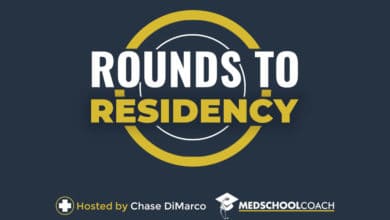Dr. Kathleen Timme discusses health literacy— why you need to have effective communication with your patients, activate the learner, and set yourself up to receive feedback.
- [01:16] How Dr. Timme Branched into the GME Spectrum
- [03:22] Health Literacy
- [07:54] The Small Group Teaching
- [12:18] Dr. Timme’s Personal Experience in the Medicine World
- [13:21] Activating the Leaner
- [16:01] How to be a Good Feedback Recipient
Chase DiMarco talks to Dr. Kathleen Timme, an Assistant Professor of Pediatric Endocrinology at the University of Utah. She also serves as the Director of Educational Development for GME and is an Associate Program Director for Fellow Education within the Pediatrics Department. She is currently pursuing a Master of Education Degree through the University of Cincinnati. They talk about health literacy— why you need to have effective communication with your patients, activate the learner, and set yourself up to receive feedback.
Graduate Medical Education
During her time in residency and fellowship, Dr. Timme realized that she enjoyed having students as part of the team. With time, she found that it became increasingly easier to share her experience and knowledge with students; thus, began the journey into graduate medical education (GME). She later joined the graduate education committee, where she worked in the department that came up with effective medical programs and curriculums. A while later, she landed a clinical level position where she could combine both administrative and educational duties.
Health Literacy
Health literacy is an essential topic within the medical world that is unfortunately not covered in med school. You might be an exceptional doctor, but once you struggle to communicate effectively with your patients, your patients will find it hard to understand you. So, understand that not everybody is an expert in medical terminology. It’s up to you to break down complex topics in a way that is perceivable to the everyday person. After explaining a condition or a treatment, use the teach-back techniques to ask your patient what they picked from the entire conversation.
Dr. Timme’s Advice to Medical Students
The initial med school years are usually all about gaining information. However, as you move towards your clinical years, there will come a time when you’ll be asked to get more involved in the teaching side of things. According to Dr. Timme, once you’re assigned a particular topic, ensure that you make your presentation engaging by incorporating whiteboards and slides. You don’t need to cover everything; just make sure your topics are clinically relevant and cover a few learning objectives.
Dr. Timme admits that since it’s still early on in her career, she often experiences the imposter syndrome where she feels like she’s not knowledgeable enough to teach others. How she goes about dealing with this is by reminding herself that there is always something to teach. When dealing with a patient, activate the learner before a clinical encounter to give the patient something to think about during the consultation.
Everybody detests negative feedback, especially med students who have to endure the competitive grade-based culture. It’s often disheartening to learn that you’re not good at something. However, once you make it to the training phase, that’s a protected period where you are allowed to make mistakes. Always have that growth mindset where you embrace constructive feedback and give your own feedback whenever necessary.
Resources:
https://pubmed.ncbi.nlm.nih.gov/25079664/
https://anchor.fm/teachinginmedicine
Sign up for a Free Coaching session with Chase DiMarco, sponsored by Prospective Doctor! You can also join the Med Mnemonist Mastermind FB Group today and learn more about study methods, memory techniques, and MORE!
